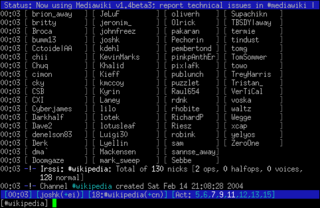
Irssi is an IRC client program for Linux, FreeBSD, macOS and Microsoft Windows. It was originally written by Timo Sirainen, and released under the terms of the GNU General Public License in January 1999.

Privoxy is a free non-caching web proxy with filtering capabilities for enhancing privacy, manipulating cookies and modifying web page data and HTTP headers before the page is rendered by the browser. Privoxy is a "privacy enhancing proxy", filtering web pages and removing advertisements. Privoxy can be customized by users, for both stand-alone systems and multi-user networks. Privoxy can be chained to other proxies and is frequently used in combination with Squid and can be used to bypass Internet censorship.
This is a list of operating systems specifically focused on security. General-purpose operating systems may be secure in practice, without being specifically "security-focused".
Technical variations of Linux distributions include support for different hardware devices and systems or software package configurations. Organisational differences may be motivated by historical reasons. Other criteria include security, including how quickly security upgrades are available; ease of package management; and number of packages available.
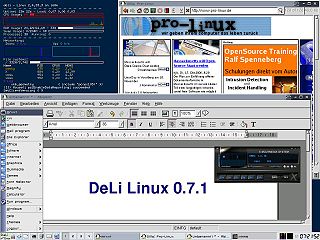
Desktop Light Linux is a discontinued desktop Linux distribution for old PCs.

Tribler is an open source decentralized BitTorrent client which allows anonymous peer-to-peer by default. Tribler is based on the BitTorrent protocol and uses an overlay network for content searching. Due to this overlay network, Tribler does not require an external website or indexing service to discover content. The user interface of Tribler is very basic and focused on ease of use instead of diversity of features. Tribler is available for Linux, Windows, and OS X.
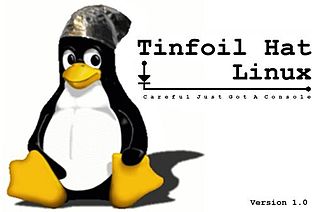
Tinfoil Hat Linux (THL) is a compact security-focused Linux distribution designed for high security developed by The Shmoo Group. The first version (1.000) was released in February 2002. It appears to be a low priority project as of 2013. Its image files and source are available in gzip format. THL can be used on almost any modern PC, as it requires a Intel 80386 or better computer, with at least 8 MB of RAM. The distribution fits on a single HD floppy. The small footprint provides additional benefits beyond making the system easy to understand and verify- the computer need not even have a hard drive, making it easier to "sanitize" the computer after use.
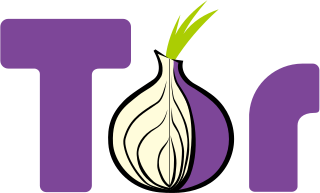
Tor is free and open-source software for enabling anonymous communication. The name derived from the acronym for the original software project name "The Onion Router". Tor directs Internet traffic through a free, worldwide, volunteer overlay network consisting of more than seven thousand relays to conceal a user's location and usage from anyone conducting network surveillance or traffic analysis. Using Tor makes it more difficult to trace Internet activity to the user: this includes "visits to Web sites, online posts, instant messages, and other communication forms". Tor's intended use is to protect the personal privacy of its users, as well as their freedom and ability to conduct confidential communication by keeping their Internet activities unmonitored.

Tails, or The Amnesic Incognito Live System, is a security-focused Debian-based Linux distribution aimed at preserving privacy and anonymity. All its incoming and outgoing connections are forced to go through Tor, and any non-anonymous connections are blocked. The system is designed to be booted as a live DVD or live USB, and will leave no digital footprint on the machine unless explicitly told to do so. The Tor Project has provided financial support for its development. According to the Whonix Project, in comparison with other anonymity-focused software or platforms, "Tails is better suited for high-risk users who face aggressive, targeted surveillance." As of the latest version, Tails comes with Secure Boot.

Dooble is a free and open-source Web browser that was created to improve privacy. Currently, Dooble is available for FreeBSD, Linux, OS X, OS/2, and Windows. Dooble uses Qt for its user interface and abstraction from the operating system and processor architecture. As a result, Dooble should be portable to any system that supports OpenSSL, POSIX threads, Qt, SQLite, and other libraries.

Parabola GNU/Linux-libre is an operating system for the i686, x86-64 and ARMv7 architectures. It is based on many of the packages from Arch Linux and Arch Linux ARM, but distinguishes from the former by offering only free software. It includes the GNU operating system components common to many Linux distributions and the Linux-libre kernel instead of the generic Linux kernel. Parabola is listed by the Free Software Foundation as a completely free operating system, true to their Free System Distribution Guidelines.

Kali Linux is a Debian-derived Linux distribution designed for digital forensics and penetration testing. It is maintained and funded by Offensive Security.
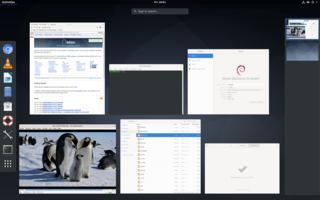
Debian releases do not follow a fixed schedule. Recent releases have been made roughly biennially by the Debian Project.

Whonix is a Debian GNU/Linux–based security-focused Linux distribution. It aims to provide privacy, security and anonymity on the internet. The operating system consists of two virtual machines, a "Workstation" and a Tor "Gateway", running Debian GNU/Linux. All communications are forced through the Tor network to accomplish this.
Parrot OS is a GNU/Linux distribution based on Debian with a focus on security, privacy, and development.

The Library Freedom Project teaches librarians about surveillance threats, privacy rights, and digital tools to thwart surveillance. In 2015 the Project began an endeavour to place relays and, particularly, exit nodes of the Tor anonymity network in public libraries.
Librem is a line of computers manufactured by Purism, SPC featuring free (libre) software. The laptop line is designed to protect privacy and freedom by providing no non-free (proprietary) software in the operating system or kernel, avoiding the Intel Active Management Technology, and gradually freeing and securing firmware. Librem laptops feature hardware hardware kill switches for the microphone, webcam, Bluetooth and Wi-Fi.
This article is a comparison of virtual private network services.
ProtonVPN is a virtual private network (VPN) service provider operated by the Swiss company Proton Technologies AG, the company behind the email service ProtonMail. According to ProtonVPN's official website, ProtonVPN and ProtonMail share the same management team, offices, and technical resources, and is operated from Proton's headquarters in Geneva, Switzerland under the protection of Swiss privacy laws.
Outline VPN is a free and open-source tool that deploys Shadowsocks servers on multiple cloud service providers. The software suite also includes client software for multiple platforms. Outline was developed by Jigsaw, a technology incubator created by Google.[3]











